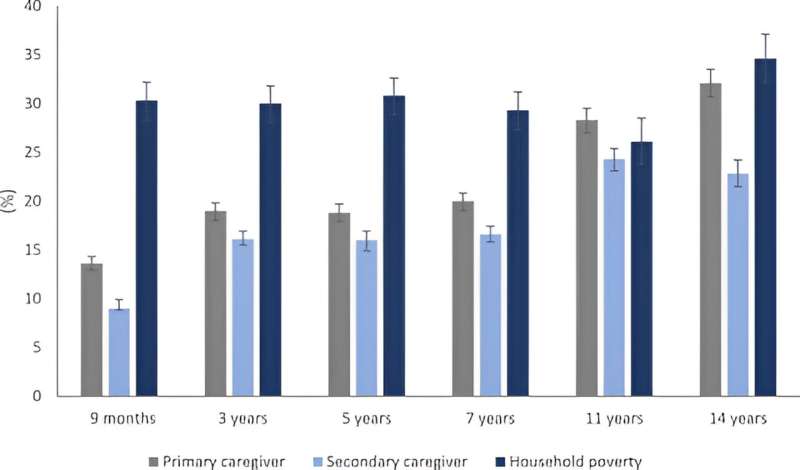This article has been reviewed according to Science X's editorial process and policies. Editors have highlighted the following attributes while ensuring the content's credibility:
fact-checked
peer-reviewed publication
trusted source
proofread
Study highlights impact of UK child poverty and caregiver mental health on future generations

Child poverty and caregiver mental health problems have large negative impacts on the health of the next generation, finds a large-scale study published in the Journal of Adolescent Health.
Led by researchers at the University of Liverpool, the study is one of the first to unpick the combined effect of both paternal and maternal caregiver mental health over multiple years of childhood, including early adolescence.
The study team, which also included researchers from King's College London and the Universities of Newcastle and Manchester, used longitudinal data on 10,500 children from the nationally representative U.K. millennium cohort study. Trajectories of poverty, maternal mental health, and secondary caregiver mental health were constructed from child age of 9 months through to 14 years. The researchers assessed the associations of these trajectories with mental health outcomes at the age of 17 years.
Corresponding author Dr. Nicholas Kofi Adjei said, "In the U.K., there are concerns about the deterioration in adult mental health and child poverty is also rising. More than half of children growing up in the U.K. are persistently exposed to either one or both of poor caregiver mental health and family poverty. Our study finds that the combination of these exposures is strongly associated with adverse health outcomes in the next generation."
The researchers identified five distinct trajectories. Compared with children with low poverty and good parental mental health, those who experienced poverty and poor primary or secondary caregiver mental health (53%) had worse outcomes. Children exposed to both persistent poverty and poor caregiver mental health were at markedly increased risk of socioemotional behavioral problems, mental health problems and cognitive disability.
They estimate that 40% of socioemotional behavioral problems at the age of 17 were attributable to persistent parental caregivers' mental health problems and poverty. Tackling these issues has the potential to lead to lifetime improvements in earnings across these adolescents of equivalent to around £6.5bn.
The University of Liverpool's Professor David Taylor Robinson said, "Reducing child poverty and parental mental health problems could result in a substantial reduction in poor health across the life course of the U.K. population, if the right policies and interventions are put in place. These findings are an important step in identifying priority areas for prevention efforts in the U.K."
More information: Nicholas Kofi Adjei et al, Impact of Parental Mental Health and Poverty on the Health of the Next Generation: A Multi-Trajectory Analysis Using the UK Millennium Cohort Study, Journal of Adolescent Health (2023). DOI: 10.1016/j.jadohealth.2023.07.029


















